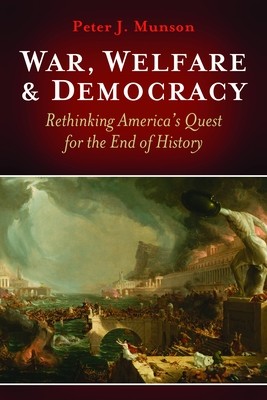
- We will send in 10–14 business days.
- Author: Peter J Munson
- Publisher: Potomac Books
- ISBN-10: 1612345395
- ISBN-13: 9781612345390
- Format: 16.1 x 23.4 x 2.2 cm, hardcover
- Language: English
- SAVE -10% with code: EXTRA
Reviews
Description
American foreign policy since World War II has actively sought to reshape both domestic and international orders, hoping to hasten the coming of the "end of history" in a peaceful democratic utopia. While the end of the Cold War heightened optimism that this goal was near, American foreign policymakers still face dramatic challenges. In War, Welfare & Democracy, Peter Munson argues that the problems we face today stem from common roots--the modern state system's struggle to cope with the pressures of market development and sociopolitical modernization. America's policies seek to treat challenges as varied as insurgency, organized crime, fiscal crises, immigration pressures, authoritarianism, and violations of human rights with a schizophrenic mix of realpolitik and idealism. The ideologies that inform this policy outlook were born during the Great Depression and two world wars and honed during the early years of the Cold War. Although the world has long since changed, American policy has failed to adjust. The crisis of the world's leading welfare states compounds this inflexibility. By addressing the inequality of wealth, security, and stability brought on by dramatic economic change and modernization, Munson describes how America can lead in reforming the welfare state paradigm and adjust its antiquated policies to best manage the transformation we must face.
EXTRA 10 % discount with code: EXTRA
The promotion ends in 17d.21:40:24
The discount code is valid when purchasing from 10 €. Discounts do not stack.
- Author: Peter J Munson
- Publisher: Potomac Books
- ISBN-10: 1612345395
- ISBN-13: 9781612345390
- Format: 16.1 x 23.4 x 2.2 cm, hardcover
- Language: English English
American foreign policy since World War II has actively sought to reshape both domestic and international orders, hoping to hasten the coming of the "end of history" in a peaceful democratic utopia. While the end of the Cold War heightened optimism that this goal was near, American foreign policymakers still face dramatic challenges. In War, Welfare & Democracy, Peter Munson argues that the problems we face today stem from common roots--the modern state system's struggle to cope with the pressures of market development and sociopolitical modernization. America's policies seek to treat challenges as varied as insurgency, organized crime, fiscal crises, immigration pressures, authoritarianism, and violations of human rights with a schizophrenic mix of realpolitik and idealism. The ideologies that inform this policy outlook were born during the Great Depression and two world wars and honed during the early years of the Cold War. Although the world has long since changed, American policy has failed to adjust. The crisis of the world's leading welfare states compounds this inflexibility. By addressing the inequality of wealth, security, and stability brought on by dramatic economic change and modernization, Munson describes how America can lead in reforming the welfare state paradigm and adjust its antiquated policies to best manage the transformation we must face.


Reviews